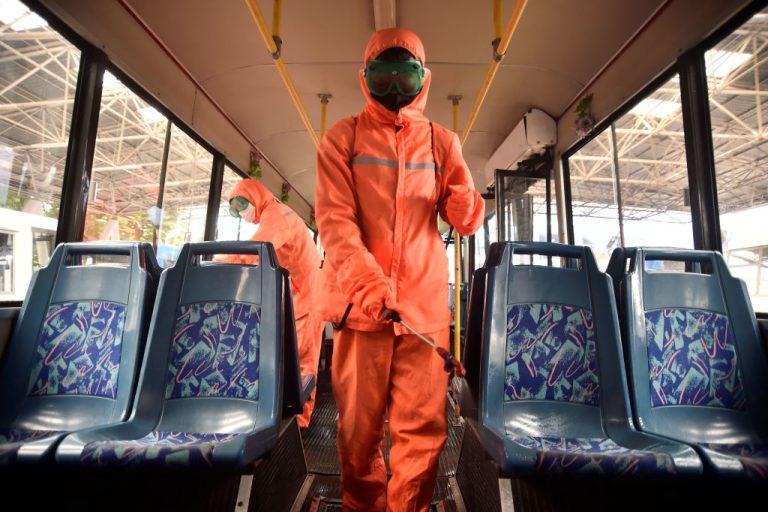While COVID-19 ravaged most of the world, North Korea claimed that the virus had not been able to penetrate its closed border, and for over two years, reported zero locally transmitted cases within its country.
This was until May 19, when the hereditary dictatorship finally admitted that it had detected one positive case stemming from a “large-scale military parade” held the previous month, and declared a “maximum emergency alert” in order to contain and quell further spread of the virus.
Now, the government’s red-code warning — which restricted movement between provinces and prohibited large gatherings — has been lifted, and the country’s authoritarian regime is getting ready to “declare victory” over the outbreak, a report by Radio Free Asia (RFA) said. A source from the northeastern province of North Hamgyong told RFA that the restrictions had been fully lifted as of June 12, and requested to remain anonymous due to security concerns.
READ MORE ON THIS:
- North Korea Admits First COVID Death, Positive Cases Suspected to Be in the Millions
- North Korea Begins Jabbing Soldiers With ‘Immortal Potions of Love’ After Admitting 1st COVID-19 Case
- Shanghai and Beijing Begin Transition to ‘New Normal’, Another Chinese City Goes Under Lockdown
‘Declaring victory’
“Residents are able to travel to other provinces and even to the capital city, Pyongyang,” the anonymous source said. “The new order from the National Emergency Quarantine Command was given to residents of each neighborhood in Pohang district.”
In addition to the lifting of restrictions, each neighborhood watch unit was also given instructions on the policy changes and how to communicate these updates with residents, the source added.
Success
You are now signed up for our newsletter
Success
Check your email to complete sign up
“They have been unable to travel outside the provincial borders with only the partial lifting of restrictions, so they welcome the news,” the source said, adding that, “It is especially great news for merchants who rely on long-distance travel between provinces for their businesses.”
On May 19, state-owned Korea Central News Agency (KCNA), reported that over 187,000 of its residents were suffering from a fever of “unknown origin,” and that makeshift quarantine facilities had been established to treat those afflicted.
Though KCNA’s report did not specify how many of those residents were suffering from COVID-19, based on its “mystery fever” statistics released by the government, the number of infections is suspected to have surpassed 3 or even 4 million.
Furthermore, North Korea has rejected other countries’ offers to have vaccines delivered, and its entire population of nearly 26 million people remains mostly unvaccinated. Last September, North Korea’s government rejected nearly three million doses of the Sinovac vaccine from its ally China, asking for them to be sent to “countries with a greater need for them.”
On May 26, the government finally began its vaccination program — with leader Kim Jong-un calling the vaccines from China “immortal potions of love” — according to recorded broadcasts played throughout the capital of Pyongyang.
READ MORE:
- Here’s Just How Badly ‘Zero-COVID’ Has Damaged China’s Economy
- Xi Tightens Grip Over Chinese Propaganda Ahead of Key Conclaves
- China Fights Uphill Battle to Rescue Its Economy While Keeping ‘Zero-COVID’
Travel between provinces remains restricted
In an effort to monitor the health status of residents, the North Korean government requires all travelers to carry special passes in order to circumvent between provinces. These requirements apply to all North Korean residents even under normal circumstances, and the rules had been further tightened during the latest outbreak.
Residents with mobile phones can access test certificates through a smartphone app, another resident from the northwestern province of North Pyongyang told RFA. Authorities in all provinces strictly enforce these regulations, and residents without the proper paperwork can be denied entry or even turned away, the source added.
“But even if the restrictions are completely ended, there is still a separate procedure that requires travelers to carry a COVID-19 test certificate issued by the quarantine command center. We can get a travel pass only if we have the test certificate,” the source said.
“In rural areas such as Pakchon county, you have to visit the town quarantine center, which is miles away, to get a COVID-19 test certificate,” the second source said, adding that, “If a resident who wants to get a test certificate does not have a mobile phone, it can be very inconvenient.”
Still, the source said that most residents are pleased that the restrictions are ending.
“Now they hope that the residents will have their livelihoods restored as soon as possible, but also by lifting the blockade of the border with China,” she said.
With China accounting for over 90 percent of North Korea’s trade activities, residents have been anxiously awaiting news on when freight shipments would resume. Earlier this year, trade between the two countries was suspended due to Beijing’s stringent “zero-COVID” protocols, resulting in disastrous ramifications on North Korea’s economy.


















